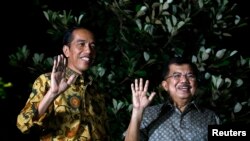After more than a month of uncertainty, Indonesia’s Constitutional Court has upheld the official election results, clearing the way for Jakarta Governor Joko Widodo to take over as Indonesia’s next head of state. Kate Lamb reports from Jakarta.
The Indonesian capital was on edge before the court decision, following a controversial election in which both candidates declared themselves the winner.
Thousands of protesters gathered on the streets near the court and police briefly used water cannons and tear gas to keep them at bay. At least eight people were injured.
The official tally of the July presidential election showed that Jakarta Governor Joko Widodo won with 53.15 percent of the vote, but his rival Prabowo Subianto defiantly refused to concede.
Charging there was widespread electoral fraud, the ex-army general lodged an appeal with the Constitutional Court.
But Constitutional Court Chairman Hamdan Zoelva announced late Thursday the court has rejected the challenge to have the election result overturned.
After the decision, Prabowo's campaign team acknowledged the court’s ruling was final, but said they did not accept it was just.
Earlier, the Prabowo camp suggested it might pursue alternative legal avenues, including at the Supreme Court and in a parliamentary hearing.
Prabowo and his running mate Hatta Rajasa did not appear at the news conference. The losing presidential candidate was reportedly visiting people hurt in Thursday's scuffle outside the court.
With the court ruling, Widodo is expected to take office on October 20 as the new leader of the world’s third-largest democracy.
The election dispute has been seen as a key test for the Indonesian judiciary, after the former chief of the Constitutional Court was jailed in June for accepting bribes.
Over the course of the proceedings, many analysts and academics perceived Prabowo’s case as legally flimsy, given the failure to present sufficient evidence and convincing witnesses.
For example, one witness was forced to admit he did not see first hand what he had alleged, reading it only in a newspaper.
Some analysts have argued that Prabowo’s dogged and protracted battle could be more about saving face. This was the third time he has campaigned for president and he has expended a huge amount of energy and money into his presidential ambitions.




